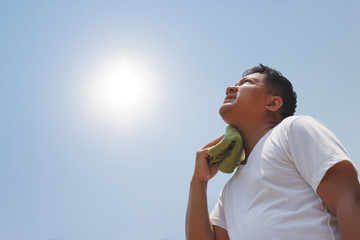Every year, especially during the hot season, heat waves can reach a scorching 40 °C, which often leads to illnesses, hospitalisations, and — in worse case scenarios — even death.
It is essential that everyone knows the proper steps to prevent these illnesses, as well as how to recognise the signs and symptoms when they do occur. For this, it’s highly recommended to take first aid training in Perth or other major cities as it will provide you with the knowledge and experience for both the prevention and treatment of these ailments. There are some health tips to help you cope with the hot weather.
As you may have often heard, prevention is better than cure, and the same applies to heat-related conditions. Below, we’re sharing with you the common illnesses people suffer during sweltering-hot weather, as well as how they can be avoided.
5 Common Heat-Related Illnesses and How You Can Avoid Them

Below are some of the most common heat-related illnesses and how you can avoid them.
1. Dehydration
Dehydration occurs when the amount of water leaving the body is greater than the amount you intake. Because of this, the body ends up not having enough fluids to carry out its standard functions.
How to avoid:
- Drink plenty of water every day
- Eat hydrating foods
- Dress for the weather, so you don’t sweat too much
- Take breaks if you’re engaging in physical activity outside
- Keep an eye out for the signs and symptoms
2. Heat Cramps
Heat cramps usually occur during or after exhausting physical activity. Intense sweating lowers the levels of moisture and salts in your body, which can lead to the muscle pain and spasms that are indicative of the condition. If the affected person is on a low-sodium diet or suffers from heart problems, seek immediate medical attention.
How to avoid:
- Stretch and warm-up before exercise
- Hydrate well before your activity
- Avoid exercising during the hottest time of day
- Wear moisture-wicking clothes
- Don’t drink beverages that increase the rate of dehydration (alcohol and caffeinated drinks)
3. Heat Rash
A heat rash is an itchy and painful skin condition that can occur in hot, humid weather. It is caused by excessive sweating that can lead to the blockage of sweat canals. It can occur at any age, but it mostly affects young children, especially infants. You need to also learn how to protect your skin from sun damage.
How to avoid:
- Keep your skin cool
- Avoid sweating when possible
- Wear loose cotton clothing
- Use lightweight bedding
- Take cool showers or baths
4. Heat Exhaustion
If you were not able to prevent or treat your heat cramps properly, the condition will likely escalate into heat exhaustion. Heat exhaustion happens right before a heat stroke, so it’s very important to treat the condition properly to prevent it from progressing and becoming a serious health risk.
How to avoid:
- Wear loose-fitting clothing
- Protect your skin from the sun
- Hydrate well
- Avoid warm areas
5. Heat Stroke
The most serious of all heat-related illnesses are heat strokes, and they’re a life-threatening emergency. They occur when the body temperature is not controlled properly, and it rises above 40 °C. During a heat stroke, you’ll notice that the sweating stops, and the body can no longer free itself of excess heat and cool down.
How to avoid:
- Take the necessary precautions to prevent heat cramps and heat exhaustion.
You can still enjoy the hot weather without risking your health
The hot weather can have its own charm. It’s great for exercising outside in the park, stretching on the beach, jumping in the pool, and enjoying a lazy afternoon barbeque.
However, as enjoyable as these activities are, they can be harmful to you or someone else’s health if you don’t manage your body temperature properly. Taking a few precautionary measures doesn’t take a lot of energy, which is why it’s best to apply them whenever possible so you can keep yourself and your loved ones safe during hot days.








